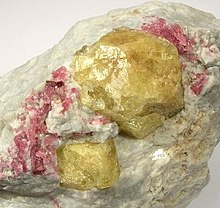Borate mineral

The Borate Minerals are minerals which contain a borate anion group. The borate (BO3) units may be polymerised similar to the SiO4 unit of the silicate mineral class. This results in B2O5, B3O6, B2O4 anions as well as more complex structures which include hydroxide or halogen anions.[2] The [B(O,OH)4]− anion exists as well.
Many borate minerals, such as borax, colemanite, and ulexite, are salts: soft, readily soluble, and found in evaporite contexts. However, some, such as boracite, are hard and resistant to weathering, more similar to the silicates.
There are over 100 different borate minerals.[2][3] Borate minerals include:
- Kernite Na2B4O6(OH)2·3H2O
- Borax Na2B4O5(OH)4·8H2O
- Ulexite NaCaB5O6(OH)6·5H2O
- Colemanite CaB3O4(OH)3·H2O
- Boracite Mg3B7O13Cl
- Painite CaZrAl9O15(BO3)
Nickel–Strunz Classification -06- Borates
[edit]IMA-CNMNC proposes a new hierarchical scheme (Mills et al., 2009). This list uses it to modify the Classification of Nickel–Strunz (mindat.org, 10 ed, pending publication). Note that although Nickel–Strunz division letters were traditionally based on the number of boron atoms in a mineral's chemical formula (06.A are monoborates, 06.B are diborates, etc.), the IMA has reclassified borate minerals based on the polymerisation of the borate anion.
- Abbreviations
- REE: rare-earth element (Sc, Y, La, Ce, Pr, Nd, Pm, Sm, Eu, Gd, Tb, Dy, Ho, Er, Tm, Yb, Lu)
- PGE: platinum-group element (Ru, Rh, Pd, Os, Ir, Pt)
- * : discredited (IMA/CNMNC status)
- ? : questionable/doubtful (IMA/CNMNC status)
Regarding 03.C Aluminofluorides, 06 Borates, 08 Vanadates (04.H V[5,6] Vanadates), 09 Silicates:
- neso-: insular (from Greek νῆσος nêsos, "island")
- soro-: grouped (from Greek σωρός sōrós, "heap, pile, mound")
- cyclo-: rings of (from Greek κύκλος kúklos, "circle")
- ino-: chained (from Greek ίνα ína, "fibre", [from Ancient Greek ἴς])
- phyllo-: sheets of (from Greek φῠ́λλον phúllon, "leaf")
- tekto-: three-dimensional framework (from Greek τεκτονικός tektōnikós, "of building")
- Nickel–Strunz code scheme: NN.XY.##x
- NN: Nickel–Strunz mineral class number
- X: Nickel–Strunz mineral division letter
- Y: Nickel–Strunz mineral family letter
- ##x: Nickel–Strunz mineral/group number; x an add-on letter
Class: borates
[edit]- 06. Alfredstelznerite
- 06.A Monoborates
- 06.AA BO3, without additional anions; 1(D): 05 Sassolite; 15 Nordenskioldine, 15 Tusionite; 35 Jimboite, 35 Kotoite; 40 Takedaite
- 06.AB BO3, with additional anions; 1(D) + OH, etc.: 05 Hambergite, 10 Berborite, 15 Jeremejevite; 20 Warwickite, 20 Yuanfuliite; 25 Karlite; 30 Azoproite, 30 Bonaccordite, 30 Fredrikssonite, 30 Ludwigite, 30 Vonsenite; 35 Pinakiolite; 40 Blatterite, 40 Orthopinakiolite, 40 Takeuchiite, 40 Chestermanite; 45 Hulsite, 45 Magnesiohulsite, 45 Aluminomagnesiohulsite; 50 Hydroxylborite, 50 Fluoborite; 55 Shabynite, 55 Wightmanite; 60 Gaudefroyite, 65 Sakhaite, 70 Harkerite; 75 IMA2008-060, 75 Pertsevite; 80 Jacquesdietrichite, 85 Painite
- 06.AC B(O,OH)4, without and with additional anions; 1(T), 1(T)+OH, etc.: 05 Sinhalite; 10 Pseudosinhalite; 15 Béhierite, 15 Schiavinatoite; 20 Frolovite; 25 Hexahydroborite; 30 Henmilite; 35 Bandylite; 40 Teepleite; 45 Moydite-(Y); 50 Carboborite; 55 Sulfoborite; 60 Luneburgite; 65 Seamanite; 70 Cahnite
- 06.H Unclassified Borates
- 06.HA Unclassified borates: 05 Chelkarite; 10 Braitschite-(Ce); 15 Satimolite; 20 Iquiqueite; 25 Wardsmithite; 30 Korzhinskite; 35 Halurgite; 40 Ekaterinite; 45 Vitimite; 50 Canavesite; 55 Qilianshanite
Subclass: nesoborates
[edit]- 06.BA Neso-diborates with double triangles B2(O,OH)5; 2(2D); 2(2D) + OH, etc.: 05 Suanite; 10 Clinokurchatovite, 10 Kurchatovite; 15 Sussexite, 15 Szaibelyite; 20 Wiserite
- 06.BB Neso-diborates with double tetrahedra B2O(OH)6; 2(2T): 05 Pinnoite; 10 Pentahydroborite
- 06.CA Neso-triborates: 10 Ameghinite; 15 Inderite; 20 Kurnakovite; 25 Inderborite; 30 Meyerhofferite; 35 Inyoite; 40 Solongoite; 45 Peprossiite-(Ce); 50 Nifontovite; 55 Olshanskyite
- 06.DA Neso-tetraborates: 10 Borax; 15 Tincalconite; 20 Hungchaoite; 25 Fedorovskite, 25 Roweite; 30 Hydrochlorborite; 35 Uralborite; 40 Numanoite, 40 Borcarite; 60 Fontarnauite
- 06.EA Neso-pentaborates: 05 Sborgite; 10 Ramanite-(Rb), 10 Ramanite-(Cs), 10 Santite; 15 Ammonioborite; 25 Ulexite
- 06.FA Neso-hexaborates: 05 Aksaite; 10 Mcallisterite; 15 Admontite; 20 Rivadavite; 25 Teruggite
Subclass: inoborates
[edit]- 06.BC Ino-diborates with triangles and/or tetrahedra: 10 Calciborite, 10 Aldzhanite*; 15 Vimsite; 20 Sibirskite, 20 Parasibirskite
- 06.CB Ino-triborates: 10 Colemanite; 15 Hydroboracite; 20 Howlite; 25 Jarandolite
- 06.DB Ino-tetraborates: 05 Kernite
- 06.EB Ino-pentaborates: 05 Larderellite; 10 Ezcurrite; 15 Probertite; 20 Tertschite; 25 Priceite
- 06.FB Ino-hexaborates: 05 Aristarainite; 10 Kaliborite
Subclass: phylloborates
[edit]- 06.CC Phyllo-triborates: 05 Johachidolite
- 06.EC Phyllo-pentaborates: 05 Biringuccite, 05 Nasinite; 10 Gowerite; 15 Veatchite, 15 Veatchite-A, 15 Veatchite-p; 20 Volkovskite; 25 Tuzlaite; 30 Heidornite; 35 Brianroulstonite
- 06.FC Phyllo-hexaborates: 05 Nobleite, 05 Tunellite, 05 Balavinskite; 10 Strontioborite; 15 Ginorite, 15 Strontioginorite; 20 Fabianite
- 06.GB Phyllo-nonaborates, etc.: 05 Studenitsite; 10 Penobsquisite; 15 Preobrazhenskite; 20 Walkerite
Subclass: tektoborates
[edit]- 06.BD Tektodiborates with tetrahedra: 05 Santarosaite
- 06.DD Tekto-tetraborates: 05 Diomignite
- 06.ED Tekto-pentaborates: 05 IMA2007-047, 05 Tyretskite, 05 Hilgardite, 05 Kurgantaite
- 06.GA Tekto-heptaborates: 05 Boracite, 05 Chambersite, 05 Ericaite; 10 Congolite, 10 Trembathite
- 06.GC Tekto-dodecaborates: 05 Rhodizite, 05 Londonite
- 06.GD Mega-tektoborates: 05 Ruitenbergite, 05 Pringleite; 10 Metaborite
See also
[edit]References
[edit]- ^ Londonite at Mindat.org
- ^ a b Klein, Cornelis and Cornelius Hurlbut, Jr., Manual of Mineralogy, Wiley, 20th ed., 1985 pp. 343 - 347 ISBN 0-471-80580-7
- ^ Webmineral.Com, Strunz group V/G - V/L
- Stuart J. Mills; Frédéric Hatert; Ernest H. Nickel & Giovanni Ferraris (2009). "The standardisation of mineral group hierarchies: application to recent nomenclature proposals" (PDF). Eur. J. Mineral. 21: 1073–1080. doi:10.1127/0935-1221/2009/0021-1994. Archived from the original (PDF) on 2011-02-17. Retrieved 2011-01-24.
- Ferraiolo, Jim. "Nickel–Strunz (Version 10) Classification System". webmineral.com.
- Hr. Dr. Udo Neumann der Uni-Tuebingen (Systematik der Minerale)
External links
[edit] Media related to Borate minerals at Wikimedia Commons
Media related to Borate minerals at Wikimedia Commons
